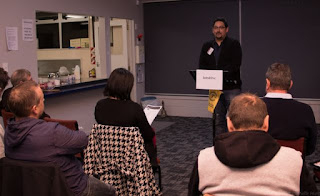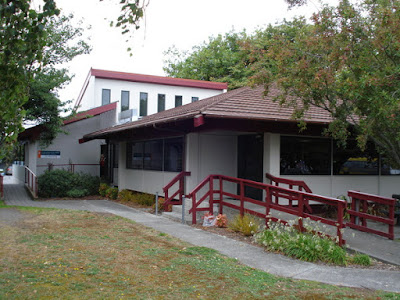Three people who have become ‘familiar faces’ at the Halswell Market are Des Kale, Judith Cain and Tina. All reside at St John of God Halswell. Here are their stories.
Des Kale, now in his early seventies, was born in Palmerston North, and grew up in Wellington. He was diagnosed with cancer on the spine at the tender age of four. Des explains his journey: "Specialists removed as much of it as they could and left some benign cancer, however in the 1960s, my legs started to go again". After some radiation treatment, the doctors sent me home with the conclusion "there was nothing more they could do for me". Ironically, Des has outlived all the doctors who had sent him home to die.
Not held back by the challenge of living without the use of legs, Des found several work opportunities. If you own a Fisher n' Paykel steam and dry iron, it is possible that Des assembled it for you in a factory in Auckland. Moving later to Christchurch, Des worked at Tate Electronics when it was in the city centre. He enjoyed his work there, however, he didn't like having to rely on people to lift him in and out of the two-storey building, and he began to look for a new job. Des's next workplace was at a Canterbury engineering firm in the 1990s until he was made redundant during a time of restructuring.
Des moved to live at St John of God Halswell as he couldn't do things at home by himself anymore. With a natural, upbeat temperament and outlook, Des finds all sorts of ways to help others. He can usually be spotted guiding new visitors to the rooms they are looking for. Other residents have noticed that Des has "become a real part of the place". Des will tell you that he loves being at St John of God and “the staff are fantastic".
Judith Cain had her life all mapped out. She is the daughter of the family who owned the well-known Christchurch company "Cain's Caterers," and with that influence had developed a real love of cooking. After qualifiying in teaching food, nutrition, clothing and textiles, Judith took a gap year in Australia. The plan was that she would come home and take over the family business with her mum the following year. All of Judith's dreams and hopes vanished in but one moment when she was rear ended by a 4WD driver, just three months after arriving in Sydney.
Left with a debilitating back injury, Judith began an eight year road of recovery. During these difficult years, Judith determinedly, began her own clothing cutting business as "clothing was a close second passion to food". Business was going well and she began to buy up real estate as a hobby. However, at the age of 46 her life took a second dramatic turn when she received the incomprehensible news that she had Muscular Sclerosis.
Judith's family eventually moved her to Christchurch where she lived in Edith Cavell home in Sumner for ten years. Three years ago, she relocated to live in St John of God Halswell.
Judith still loves to chat about cooking and clothing, and while finding most movements difficult, she still has some use of her hands. It has recently been suggested that she use some of her many cooking skills to help in the kitchen of the Occupational Therapy room at St John of God Halswell. "It's not over yet!" says Judith with a beaming smile.
Tina moved to St John of God Halswell three and a half years ago, leaving her home in Burnside as household activities had become hazardous for her. Tina was born and raised in Christchurch, and attended Burwood Primary, Shirley Intermediate, and Burnside High School. As a child, she can remember being in trouble for being side-tracked by reading. She was an able student who was encouraged to sit six subjects for School Certificate, instead of the usual five. Tina thought about what would be a long term employable skill and trained to be a typist.
Marriage came next at age twenty, then, Tina had her first child, Rowena. At the age of 23, Tina received the devastating news that she had Multiple Sclerosis. Her son James was born after that diagnosis and Tina's children became her salvation and strength to face the battles ahead.
Simply finding that she had very little time to think about herself, as all young mothers do, she focused on doing all that she could for her children. She took them to Plunket, kindergarten and school escorting them by ridingon her mobility scooter. Tina continued to focus on her family's needs above her own, and her efforts paid off as her children grew into capable adults with careers in law and mechanics.
Tina talks of the deeper changes in her thinking. Her experiences taught her that "life is not all fun and games," and "if something good comes along, you need to take it with both hands, because the next day it may be gone."
Today, family has continued to be a large focus for Tina; she loves to go shopping with her daughter for her new grandchild and frequently visits her elderly mum. In her free time, she makes her way through the big pile of books in her room and enjoys tending to her garden.
Sometimes, life can throw some pretty big curve balls. The experiences that Des, Judith and Tina have had to deal with, are about as difficult as it gets. We can learn so much from them about coping with the unexpected, how to live with changed dreams and how to find a new pathway that will bring a sense of fulfilment and joy.











